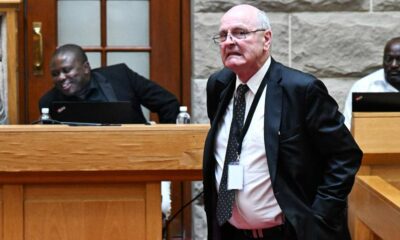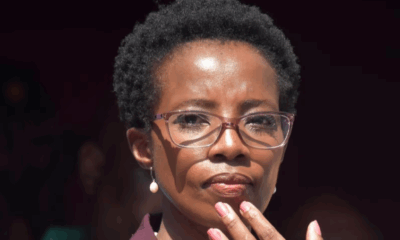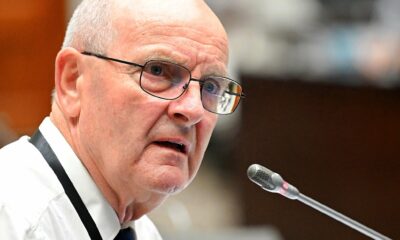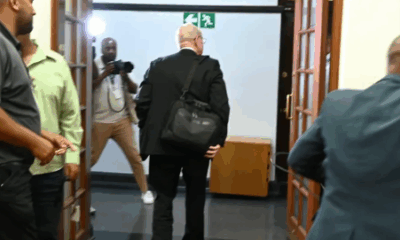News
Sibiya Dodges WhatsApp Spy Question as MPs Probe SAPS’ Secret Capabilities

Sibiya Dodges WhatsApp Spy Question as MPs Probe Crime Intelligence’s Reach
Parliament pushes for answers on surveillance tech, but SAPS leadership keeps its lips sealed
Can South Africa’s Crime Intelligence unit read your WhatsApp messages even after you’ve deleted them? Parliament tried to get a straight answer this week, but suspended deputy national police commissioner Shadrack Sibiya wasn’t giving anything away.
Appearing before Parliament’s ad hoc committee investigating alleged abuse of power in the SAPS, Sibiya was pressed repeatedly on whether Crime Intelligence has advanced surveillance capabilities that allow access to WhatsApp chats and deleted content.
His response? A firm refusal to confirm or deny.
“It would be irresponsible of me to respond… I would be displaying out there the capacity of Crime Intelligence,” he told MPs.
A Question That Won’t Go Away
The line of questioning was sparked by earlier testimony from KwaZulu-Natal police commissioner Lt-General Nhlanhla Mkhwanazi, who claimed Crime Intelligence does indeed possess technology that can retrieve deleted WhatsApp messages.
Patriotic Alliance MP Ashley Sauls tried to get Sibiya to confirm or contradict that statement, but the suspended general wouldn’t bite.
“If I say yes or no, the criminals out there will benefit,” he argued.
Even when asked whether the committee should accept Mkhwanazi’s version of events at face value, Sibiya ducked again, insisting such details remain classified.
Outsourcing, Private Tech and Rumours of Powerful Tools
Sauls also raised an allegation doing the rounds: that some of these spy capabilities may be outsourced to a private company with links to a relative of a former Cabinet minister. Sibiya said he knew nothing about that claim, but did acknowledge a troubling reality, private security firms in South Africa often have access to powerful surveillance tech imported legally or illegally.
“Some may be licensed, some may not be licensed, but they invest in technology,” he said.
For activists worried about unregulated spying, that comment didn’t exactly offer comfort.
Who Has Clearance and Who Doesn’t?
The hearings also reopened awkward questions about who in SAPS is actually cleared to handle classified information.
Sibiya confirmed he holds security clearance and said all provincial commissioners are expected to have top-secret clearance.
But in reality? They don’t.
He named KwaZulu-Natal commissioner Mkhwanazi and Western Cape commissioner Lt-General Thembisile Patekile as examples of senior officials operating without such clearance despite handling sensitive matters.
Mkhwanazi reportedly still has access to some classified material through his involvement in the controversial PKTT investigation, where Crime Intelligence boss Lt-General Khumalo was structured to report to him directly.
That raised eyebrows among MPs.
ANC MP Xola Nqola questioned why a provincial commissioner would be receiving intelligence briefings from a national division.
Sibiya insisted the reporting structure was designed specifically for that investigation.
Why This Story Matters
South Africans already live in a climate of digital anxiety from cellphone metadata being used in court to WhatsApp voice notes ending up in criminal dockets. The idea that police might be accessing deleted conversations without clear oversight is something many locals take seriously.
Online, the reaction has been split.
Some users argue secrecy is justified to stop criminals adapting. Others believe the public has a right to know what state surveillance tools exist especially in a country with a history of political spying and weaponised intelligence.
The Bigger Problem No One Wants to Admit
The exchange also highlights a deeper issue: a police service with blurred reporting lines, uneven vetting, and tech capabilities that may outpace regulation.
If Crime Intelligence does have the power to access encrypted apps, who signs off on its use? Who checks the chain of custody? And how many private contractors are in the loop?
Sibiya’s refusal to speak may have been intentional but it leaves the public to fill in the silence with speculation.
WhatsApp Isn’t the Only Question
As Parliament continues its inquiry into alleged power abuses within SAPS, this won’t be the last time MPs press for answers about secret surveillance.
And while Sibiya insists that confirming such tools would “benefit criminals”, many South Africans are wondering something else: who, exactly, does silence protect?
{Source: IOL}
Follow Joburg ETC on Facebook, Twitter , TikTok and Instagram
For more News in Johannesburg, visit joburgetc.com

























